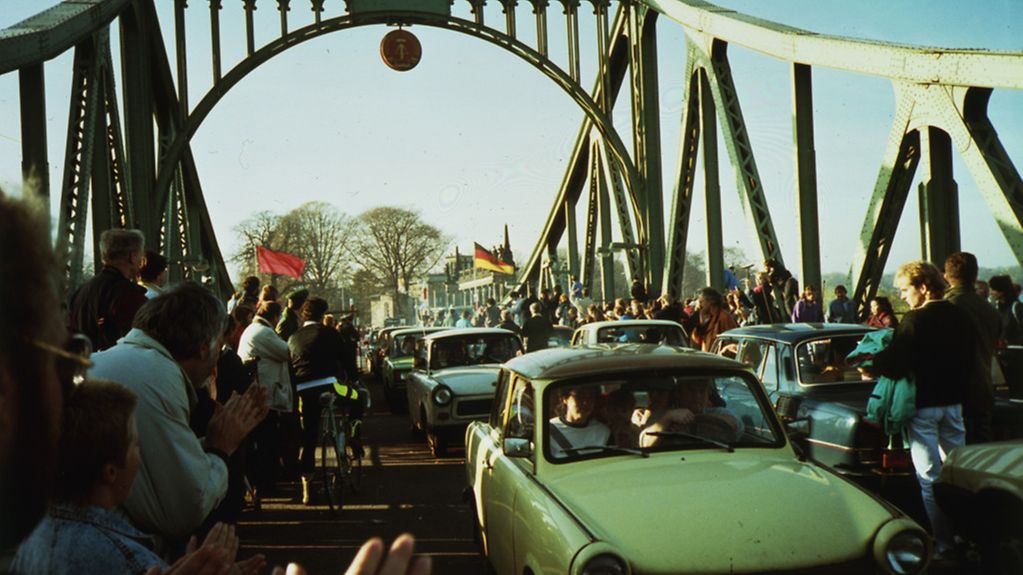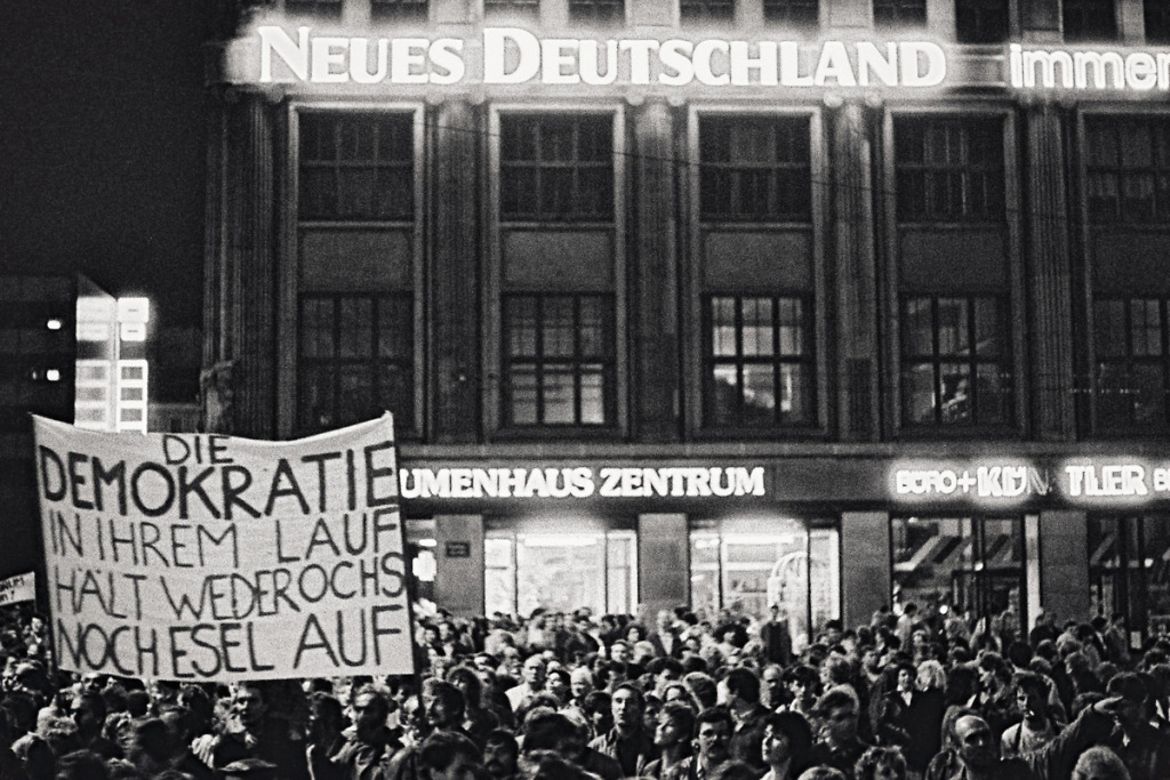Commemoration and remembrance
9 November is a day that mirrors German 20th century history unlike any other. This day is the anniversary of many key events. It is often referred to as the "day of destiny of the German people".
4 min reading time

Thousands of East Germans streamed across the border. The Berlin Wall fell 28 years after it was built.
Photo: picture-alliance / akg-images
Many people think immediately of the fall of the Berlin Wall when they think of 9 November. With an awkwardly worded announcement that travel restrictions were to be eased, Günter Schabowski, member of the East German Politburo, provoked thousands of East Germans to storm border control posts. Rash words, which were followed by the fall of the Berlin Wall and German reunification.
"Immediately! With immediate effect"
In response to the question posed by a journalist as to when the new liberalised travel regulations would come into effect for the East German people, Günter Schabowski stammered, at a press conference in the evening of 9 November, "As far as I am aware … immediately …with immediate effect". His response spread like wildfire. A large number of East Germans had watched the press conference, which was shown on television as of seven o’clock in the evening. Many of them couldn’t believe their ears. Incredulously, the first Berliners walked to the border crossing points and asked about crossing into the other half of the city. They were joined by more and more people as the evening wore on. The requests to cross the border became a chant, "We want out!"
At half past eleven that evening their wishes were granted: the border crossing point at the Bornholmer Straße was opened for all Berliners. Other border crossing points followed. The impenetrable wall was open, 28 years, 2 months and 28 days after it was built. When the Berlin Wall fell, the entire length of the East-West German border suddenly became passable: the road was free for German reunification.
Peaceful revolution and the fall of the Berlin Wall
Tears of joy, hugs and incredulous head-shaking on the streets of Berlin: hardly anybody would have expected, or even dared to hope that the Berlin Wall, the bulwark of the Cold War, would ever fall.
The peaceful revolution paved the way for change, and forced the leadership of the German Democratic Republic to make more and more concessions on travel restrictions. But the East German leaders had not intended to let their citizens leave the country as swiftly as it was announced on 9 November 1989. The now legendary response of Günter Schabowski, however, triggered a momentum that was simply unstoppable.
Günter Schabowski, who died on 1 November 2015, thus changed the history of the world. Many years later he critically analysed his own role within the SED, the Socialist Unity Party of East Germany, and within the leadership of the German Democratic Republic. He accepted his responsibility and his moral guilt. He was the only member of the SED leadership who was willing to recognise his own guilt.
The date of the Reichpogromnacht
9 November, however, is not only the day that the Berlin Wall fell. In 1918 the abdication of Kaiser Wilhem II ended the German Empire on 9 November, after four dreadful years of war. Five years later, on 9 November 1923, Adolf Hitler attempted to overthrow the young Weimar Democracy in what become known as the Beer Hall Putsch.
The date of 9 November 1938 is synonymous with fear and terror. On this night Nazi storm troopers (known as the SA) and the SS torched synagogues across Germany. They plundered Jewish-owned businesses, destroyed the homes of Jewish citizens, abused their inhabitants, and arrested and killed a substantial number of them. That marked the start of a process that would lead to the murder or millions, the rupture with civilisation that was the Holocaust or Shoah. 9 November became a day of shame and disgrace. It was to be 61 years before 9 November became a day of joy and happiness again.
Jewish businesspeople during the Nazi era
This year, the Federal Ministry of Justice is holding a special event to commemorate the former users of the building in Berlin’s Mohrenstraße 37/38, which today houses the ministry. Before the Second World War, the building was home to 59 fashion centres. The nearby Hausvogteiplatz was the heart of the German fashion scene – until the Nazis confiscated the property of the mostly Jewish businesspeople, persecuted them and murdered many of them.
Research scientists from Berlin’s Humboldt University have investigated the fates of these businesspeople and their families on behalf of the Federal Ministry of Justice. On the evening of 9 November this year, they will present the results of their work.
The German government supports and promotes the remembrance of the Reichspogromnacht and the fall of the Berlin Wall. It is very fortunate that the more recent date is synonymous with the victory of freedom and liberty.
















